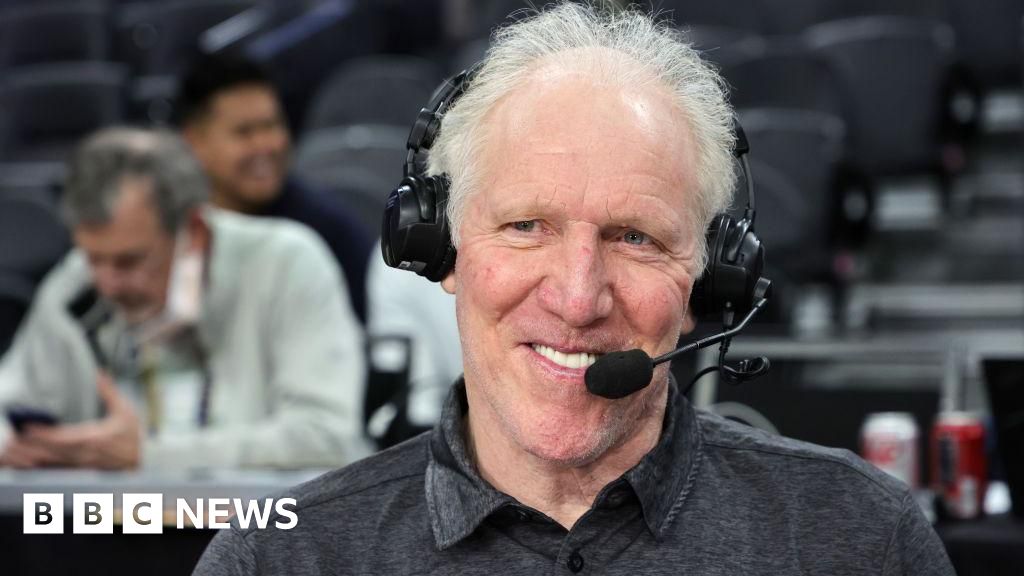Image source, Getty Images
- author, Nadine Yousif
- role, BBC News
-
As a child, Maya Chupkova suffered from a “really bad stutter.” In kindergarten, she struggled to speak and was relentlessly teased about it.
“I tried really hard to hide it but it was so energy-sapping,” she told the BBC from her San Francisco home this week.
To cope with that, she took up sports like basketball and volleyball.
“Sports was my happy place. I could be on the court, excel and have fun with my friends without having to talk,” the now 31-year-old said.
Growing up, one of her idols was Bill Walton, the college basketball superstar and NBA Hall of Famer who later became a successful sports announcer despite a lifelong stutter.
Walton died Monday at age 71 after a long battle with cancer.
Some fans, including Chupkov, have paid tribute to his long-standing work on behalf of others with speech impediments.
“The fact that he was so successful despite having a stutter has always kept me going,” said Chupkov, who also hosts the podcast “Proud Stutter.”
Walton is perhaps best known for his legendary college basketball career.
He played three years at the University of California, Los Angeles, leading the Bruins to two championships and an unprecedented 86-4 record.
In Oregon, he is remembered as a key player in helping the Portland Trail Blazers win their first and only NBA championship in 1977.
But to many who stutter, Walton was a role model who spoke openly about his struggles with the speech impediment while forging an Emmy Award-winning broadcasting career known for his colorful commentary and charisma.
“Someone like Bill Walton is so important because he's like, 'Look, I stutter sometimes but I'm a news anchor for NBC',” Jane Fraser, chairman of the US-based Stuttering Foundation, told the BBC.
Image source, Maya Chupkov
Stuttering is a type of speech disorder in which the flow of words is interrupted by repetitions, long sounds, or silent pauses.
According to the Stuttering Foundation, it is estimated that more than 80 million people stutter, or about 1% of the world's population.
Of those, 3 million are Americans, including President Joe Biden, who has spoken about the challenges he faced with a stutter since childhood.
“I used to have a hard time talking on the phone or standing up in front of people,” Biden said earlier this year, while offering advice to a 9-year-old boy who also stutters.
Scientists still don't know what causes stuttering, but research suggests it may involve areas of the brain responsible for planning and executing speech.
There is also no known cure for stuttering. Instead, treatment focuses on speech therapy and finding strategies to help people cope and live with stuttering.
Throughout his public life, Walton has been open about how he dealt with his stutter.
In an interview with the Stuttering Foundation in the 1990s (for which he served as an ambassador), he recalled basketball being a sanctuary.
He said sports has also given him ways to manage his stutter, such as applying techniques he used while playing basketball to his speech training and focusing on the fundamentals.
After a chronic foot injury ended his professional playing career at age 36, Walton turned to broadcasting.
It wasn't an easy transition, he told the foundation, as it brought back old fears about his stuttering.
Fraser, president of the Stuttering Foundation, said Walton was one of the most dedicated celebrity ambassadors the foundation has ever had.
“We knew that if someone contacted us and said they wanted to reach out to Bill (for advice), he would respond,” she said.
His activism has inspired other professional basketball players, like former NBA player Michael Kidd-Gilchrist, to speak openly about their own speech impediments.
“It's been great to see him succeed,” he said, calling Walton a “pillar” for both basketball players and people who stutter.
After eight years in the NBA, Kidd-Gilchrist founded a charity focused on getting health insurance to cover speech therapy, which can be expensive for low-income Americans.
He said basketball gave him a community growing up, but it also brought a new challenge once his professional career took off: Suddenly, there was pressure to give media interviews.
“It took a big toll on me mentally when I was younger,” the 30-year-old said.
He said his foundation serves as a space to talk openly about these struggles and challenge the stigma surrounding stuttering.
Image source, Getty Images
He says there are many misconceptions about people who stutter.
These include the false belief that people who stutter are less intelligent, or that stuttering is a sign of nervousness or stress.
But actually, “it's not a bad thing,” he says, “and I think Bill Walton is a testament to the acceptance of stuttering.”
There's also a misconception that stuttering can always be “overcome,” says Ana de Jesus, a 24-year-old basketball player at California State University, Northridge.
Despite facing those expectations, she said, “the path I'm on is more one of acceptance.”
That was the message Walton sought to convey through his work.
“I used to be very embarrassed about my stuttering,” he once said.
“But now I realize it's a part of me and something I have to deal with and work on every day.”
Fraser said Walton has received numerous accolades and has “established a long tradition of helping others” that will impact future generations.
“I think that's his immortality,” she said.


